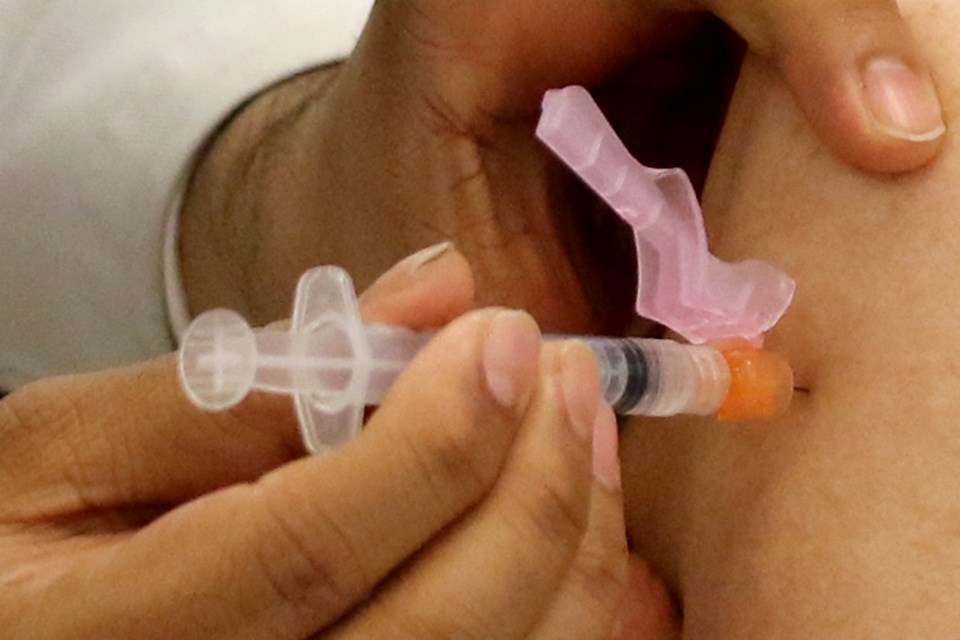TORONTO, Ont. - The provincial government is looking at offering the AstraZeneca vaccine as a second dose within a 12-week period to those who received it as a first dose.
During a media briefing on Friday, chief medical officer of health Dr. David Williams said the risk of developing vaccine-induced immune thrombotic thrombocytopenia or blood clot is reduced with the second dose to approximately one in 600,000.
The province suspended the use of AstraZeneca as a first dose out of an abundance of caution after the risk of developing VITT was found to be approximately one in 60,000.
“These numbers sound like something but they are very low risk in situations, especially compared to COVID,” Williams said. “We want to make sure it is safe, continues to be safe, and is efficacious. We are still in the third wave and have people in their 20s and 30s ending up in the ICU. The risks of getting COVID far exceed any risks associated with the vaccine, especially with the second dose.”
Between March 10 and May 11, approximately one million people in Ontario received the AstraZeneca vaccine.
Williams said people who have received the AstraZeneca vaccine as a first dose will have the opportunity to receive it as a second dose within the recommended 12-week interval, which is the time period research has shown it to be most effective.
“The province is working with primary care providers and pharmacies to ensure second dose appointments are scheduled in advance of the 12-week interval, and will provide further information on how individuals who received their first dose of AstraZeneca can book a second dose appointment in the near future,” a statement from the province reads.
AstraZeneca was first introduced as part of a pilot project to offer vaccines in pharmacies in three Southern Ontario regions on March 10 but only became available in three Thunder Bay pharmacies on April 8 to individuals between the ages of 55 and 64 and later expanding to those 40 plus.
Individuals who received their first dose as part of that pilot between March 10 and 19 will be eligible to receive the second-dose within a 10-week interval.
The efficacy of the second dose after the 10-week period is approximately 70 to 75 per cent, while at the 12-week interval it increases to between 80 and 90 per cent.
The move comes as the province has approximately 55,000 AstraZeneca doses set to lose their efficacy at the end of the month. The province will receive an additional 255,000 doses with more expected.
The province is also reviewing data from the U.K. on the efficacy and safety of mixing different vaccine brands, such as Pfizer and Moderna, which are mRNA, and AstraZeneva, a viral vector vaccine.
“At this time, National Advisory Committee on Immunization does not recommend that vaccines of different types (e.g., mRNA vaccine and viral vector vaccine) be used in the two-dose series, as data on the immune response following mixed vaccine schedules are not yet available,” the province said in a statement.
“Further information from clinical trials and NACI’s recommendation are anticipated to be available in June 2021.”
Dr. Dirk Huyer, coordinator of the province’s outbreak response, said there has been a great deal of interest from people in Ontario wishing to receive the second dose of the AstraZeneca vaccine.
“We have seen and heard significant requests for this opportunity and we are providing all best efforts in a very reach out way to let people know,” he said. “There will be conversations held at the local level where the vaccines were provided to be able to reach out to notify them of the opportunity.”
But Huyer also acknowledged the confusion and concerns regarding the AstraZeneca vaccine.
“We hear you. We completely understand how it’s challenging,” he said. “What we want to do is ensure people have the best information available, the best science, the best data, the best knowledge in a timely way to be able to make their decision.”
“We continue to recognize how beneficial this vaccine was and is and the second dose will provide even greater protection from infection, serious illness, and death.”
